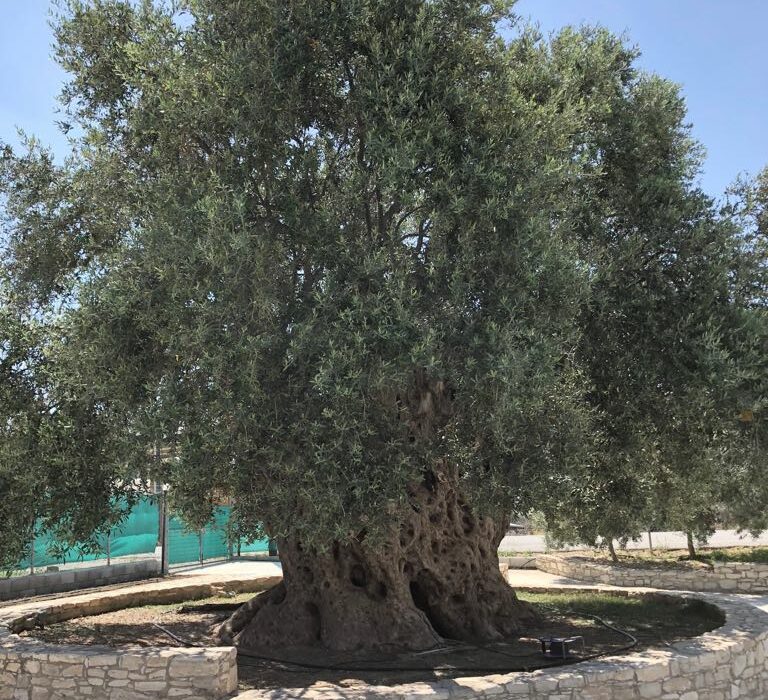
Dear reader: in this post and further subsequent ones, I will talk about a number of trees which hold special places in the culture of the Palestinian people and have a significant influence on their way of life both in Palestine and those who found themselves having to Live in other countries as a consequence of the tragic Palestinian diaspora. Over the coming weeks and months, I will occasionally return to the topic of trees to focus on one specific tree. Of course, I will post about other aspects of Palestinian life in between, lest I bore you with horticultural talk for weeks to come.
I am also open to suggestions on what specific cultural topics about Palestine you would like me to cover. Please, do not suggest politics, wars or who is right or who is wrong in the on-going conflict in the region. This particular blog is well aware of these important issues but, it is not intended as a forum for it.
So, to this post about the Olive Tree.
In the holy Quran, Chapter 95 (At-Teen), the first four verses are very interesting and quite relevant now. It combines the people of the three religions as God’s perfect creation. It describes the land of Palestine as the birthplace of Jesus Christ as the land where figs and olive trees are cultivated; Mount Sinai as the place where Moses received the Ten Commandments from God; and the land of safety, Mecca as the birthplace of the Prophet Mohammad who preached and spread the word of Islam.
I am no authority on the complex messages and meanings of the verses of the holy Quran but, I do remember from many years ago the religious education lesson when the teacher explained the meaning of these particular verses. It mostly went over my head at the time however, I can see now more than I did as a young adolescent. I am struck by how the land of Palestine is associated with the olive tree, which probably goes a long way to explain why the people of Palestine hold the olive tree in their culture with such reverence. I cannot be 100% certain but, I believe the olive tree is the most commonly cultivated tree of all in Palestine. It is a hardy, long-living plant that can survive the harshest of elements for hundreds of years. As it grows older, it starts to resemble an old man with gnarled and twisted parts but always gaining character that can tell a thousand stories of yester years.
Although the Quran describes the Holy Land as the home of figs and olives, it cannot be claimed that the olive tree was first discovered as a wild plant and then domesticated for human use. Archeological evidence suggests this happened some eight or nine thousand years ago in Persia or Mesopotamia before it was adopted by the inhabitant of the Levant region where the weather was ideal for cultivating this plant. Archeological digs found evidence south of the city of Haifa of olive fruit being pressed to extract oil over six thousand years ago. The olive tree continued its conquest journey west along and around the Mediterranean Sea, where it was planted in much larger mass land than the Levant region. Now, Spain is the major producer of olive oil in the world, followed by Italy, Greece, and Turkey.
An olive branch as a symbol of peace made the rounds all over the world. There are two schools of thought. Ancient Greece adopted this practice to signal peaceful intentions and the olive branch held by a dove appears in paintings and old coins. There are those however, who say that the Egyptians started this practice hundreds of years earlier. Either way, to this day, the olive branch is used to signal peaceful intentions. Even the Great Seal of the United States shows a bold eagle holding an olive branch with thirteen leaves and thirteen olives in its right talon while the left talon is holding a bundle of 13 arrows. These two symbols indicate the readiness of the country to deal with others by peaceful or belligerent means.
Setting aside the symbolism of the olive tree or its branches, for us Palestinians, the fruit of the olive tree and its dead branches are rich sources for humans to make use of. Olive harvest time is usually between October and November, often after the first rain of the Autumn/Winter seasons. The olives can be pickled in brine to be served as a side dish at every meal of the day. Most of the olives however, are pressed to extract the olive oil, which is stored for the rest of the year. The pulp from the crushed stones of the olives is dried and used as a fuel for heating and lighting houses or for outdoor fires. The dead branches are also chopped and used for the same purposes. The aroma from burning the dried olive pulp and wood is an absolute joy to experience. More importantly, nothing is wasted from the yield of the olive tree.
Turning to the actual olive oil extracted, the sage green liquid is the one ingredient that almost certain to be included in just about every meal in Palestinian cuisine. I cannot imagine cooking the majority of meals associated with Palestinian culture without using the best quality extra virgin olive oil. Some meals such as Musakhan, pastries, salad dressings cannot be described as Palestinian meals without plenty of olive oil. A breakfast staple offering is zaatar (wild thyme) and olive oil with freshly baked bread. Valued friends or relatives are gifted olive oil as a sign of love and affection they are held in.
Further, olive oil is used to make soap, most famously made in old factories in the city of Nablus. It is also used as a skin moisturizer or balm for massaging muscular aches and olive oil is more than an essential cooking ingredient, it is the stuff of life itself. It reinforces our identity and nationhood like no other substance. The tree itself is revered and loved for what it gives its owners and it is tended with care and a sense of duty to be passed on to the next generation of Palestinians. When a Palestinian, young or old, acquires a new piece of land, you can bet your last cent that he/she will make a list of trees to plant and right at the top of the list will be olive trees.
I vividly remember lying and often sleeping under an olive tree in our village near Ramallah feeling all is well and safe in the world. It is escapism, pure and simple and I loved it. How I long for the opportunity to do so again one day.



Extra virgen olive oil – the elixir of life!
Next post about Dabke, please!
Ohhh, my friend, you want to talk about olive trees and olive oil you should have met my grandfather Kamel. That man used to wake up every morning for morning prayers and would have a tall glass of olive oil for the morning, made his face light up and did it give him good health.
Another valued information about the olive oil and its enriching power: according to Greek mythology, Achilles was dipped in olive oil but his mother, but because she was holding him from his ankles, all his body was tough except his ankles were his weakest point.
And I am sure if you put a bunch of old Palestinian men and women together and get them to ramble about the olive tree, you will not be able to finish in a million year.